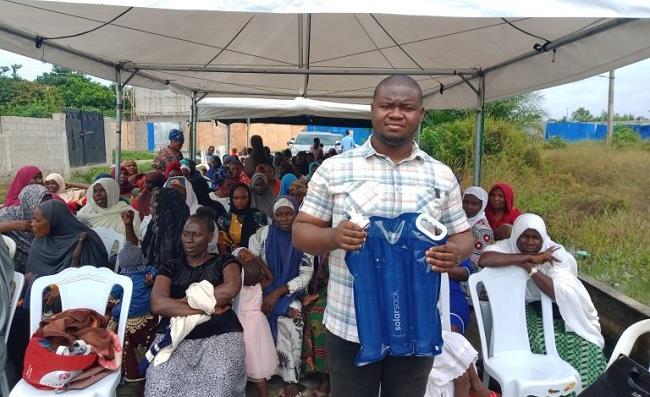Blu Impact, a non-governmental organisation (NGO), has distributed 210 water treatment solar sacks to women Internally Displaced Persons (IDPs) inIDPs Lagos.

Mrs Judith Obiajulu-Isaac, Co-founder, Blu Impact, gave out the items on Tuesday, August 16, 2022, at an event organised to teach the beneficiaries the importance of drinking safe water.
Obiajulu-Isaac said on the sidelines of the event that her organisation targets vulnerable people in communities.
“People who probably don’t have access to things like safe drinking water, you know, are very susceptible to things like cholera, diarrhea and other waterborne diseases.
“We are basically here to provide simple solutions that will help these communities provide just basic things to improve their lives,” she said.
She described the solar sack as an innovative water purification device that has the potential to make people have access to clean, potable water.
She said the sack’s unique approach to water purification is based on the use of the sun’s readily available energy to produce drinking water.
“To use the solar sack, simply fill the bag with water and place it in sunlight.
“After two to four hours, depending on the intensity of the sun, the water will be safe for drinking,” Obiajulu-Isaac said.
She said the ultraviolet rays of the sun and heat help in killing the germs in the water.
She added that, going by the present exchange rate, each of the solar sacks costs $7.
Obiajulu-Isaac said the project was in partnership with Sesor Empowerment Foundation, who already was taking care of women IDPs in Lagos and across the country.
The co-founder said that they intend to engage the women in their neighborhoods to ensure that they were using the technology for their benefit.
“So, this is the pilot phase.
“We are targeting 10 million people in 10 years to ensure that they have access to clean, safe and portable water.
“60 million people in Nigeria don’t have access to safe drinking water.
“So, that’s the plan and we’re just starting with this 210 people.
“So in the next one year, if we can reach up to 500,000 people; that will be fantastic for us,” Obiajulu Isaac said.
She said that her organisation was open to partnerships with the government and the organised private sector to provide safe, portable and clean water for the majority of Nigerians.
On the acceptability of the solar sack for use, Obiajulu-Isaac said that the solar sack had gained international recognition.
“The solar sack is on the UN list of approved products for water purification. So internationally, it has gained recognition.
“It’s been used extensively in East Africa and in Ghana; so it does have industry certifications and all of that globally.
“However in Nigeria, we didn’t just want to rest on global certifications. We wanted to test its efficacy in our climate.
“So we had the Ministry of Water Resources ran a test on it in two main locations; one in Kano, and one in Lagos,” she said.
She said the different locations for examining the solar sack were as a result of the differentials intensity of the sun.
She said the test done in the North showed that after subjecting the solar sack to the sun for one hour, the bacteria and pathogens in the water were killed.
She said the same result was achieved in Lagos, but after the bag was left for about two to three hours, because of the cloudy nature of the city.
Also speaking, Mrs Merit Arike-Emmanuel, Head of Programmes, Sesor Empowerment Foundation, said the foundation worked with displaced persons to help them thrive by providing psychosocial and economic support for them.
She said they have provided support for the women in their businesses and the education of their children.
She also said that they are partnering with Blu Impact to address the water challenge of the women they catered for.
Blu Impact was set out to lead development efforts by combining innovation and partnerships to create social impact.
It also strengthens vulnerable communities to build capacity to fight diseases.
By Fabian Ekeruche
